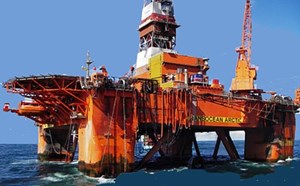Oil collapse helped DNO clinch hostile takeover, Faroe CEO says
OSLO (Bloomberg) -- Oil’s collapse at the end of last year was critical to DNO ASA clinching the hostile takeover of Faroe Petroleum Plc after a contentious battle for control, the target company’s boss said.
DNO timed its bid for Faroe as oil was in the midst of a slump, dropping more than 35% by the end of 2018 from a four-year high in early October. The Norwegian bidder has argued this made its offer even more attractive, while Faroe’s management insisted it offer undervalued the company.
“It was entirely the oil price” and DNO’s timing, Faroe’s CEO Graham Stewart said in an interview Friday. “If the oil price had improved in that period” then the company’s shareholders may have been tempted not to sell their holding, he said.
After weeks of resistance, Faroe’s board eventually surrendered to DNO’s approach after the offer was raised to $2.05 (160 pence) a share from an earlier $1.95 (152 pence). DNO said Friday it now owns 63.32% in Faroe, forcing Stewart, finance boss Jonathan Cooper and Chief Operating Officer Helge Hammer to resign.
The final offer implies a value of $823 million (641.7 million pounds) for the entire fully diluted share capital of Faroe, according to DNO. Earlier this month, Faroe released an independent valuation report suggesting it could be worth as much as $1.1 billion.
DNO had got acceptances for about 43 percent of Faroe’s shares at the end of the deadline for investors to accept the initial $1.95- (152-pence) a-share offer. Though that was below the level that gave DNO control, it left the Faroe management with “a tall order” to persuade others from holding back, Stewart said.
The company’s management and investors who had held out eventually caved when DNO bumped up the offer by about 5%.
Since DNO initially bid on Nov. 26, Faroe had urged shareholders to reject what it called an “opportunistic” offer. That was followed by an escalation of the heated exchanges between the companies, with DNO repeatedly criticizing Faroe’s management, and questioning the corporate culture and “disdainful” attitude. Faroe’s board insisted the business was worth substantially more than DNO was offering.
‘Tiger’s jaw’
“When your head is in the tiger’s jaws, it’s never a fair fight” in negotiations, Stewart said. “I think we did quite well in getting to where we got.”
Stewart owned about 2.5 million shares in Faroe as of the end of last year, valuing them at 4 million pounds at DNO’s final offer price. He also holds separate share options. CFO Cooper had 657,792 and COO Hammer 1.3 million. The three executives will leave Faroe by the end of their three-month notice period, according to a statement Friday.
Despite his exit, Stewart could remain in the oil industry, likely starting a new venture to invest in and around fields in the North Sea. It would be natural for him to exploit his knowledge of U.K. and Norwegian areas in his two-decade stint with Faroe, he said.



